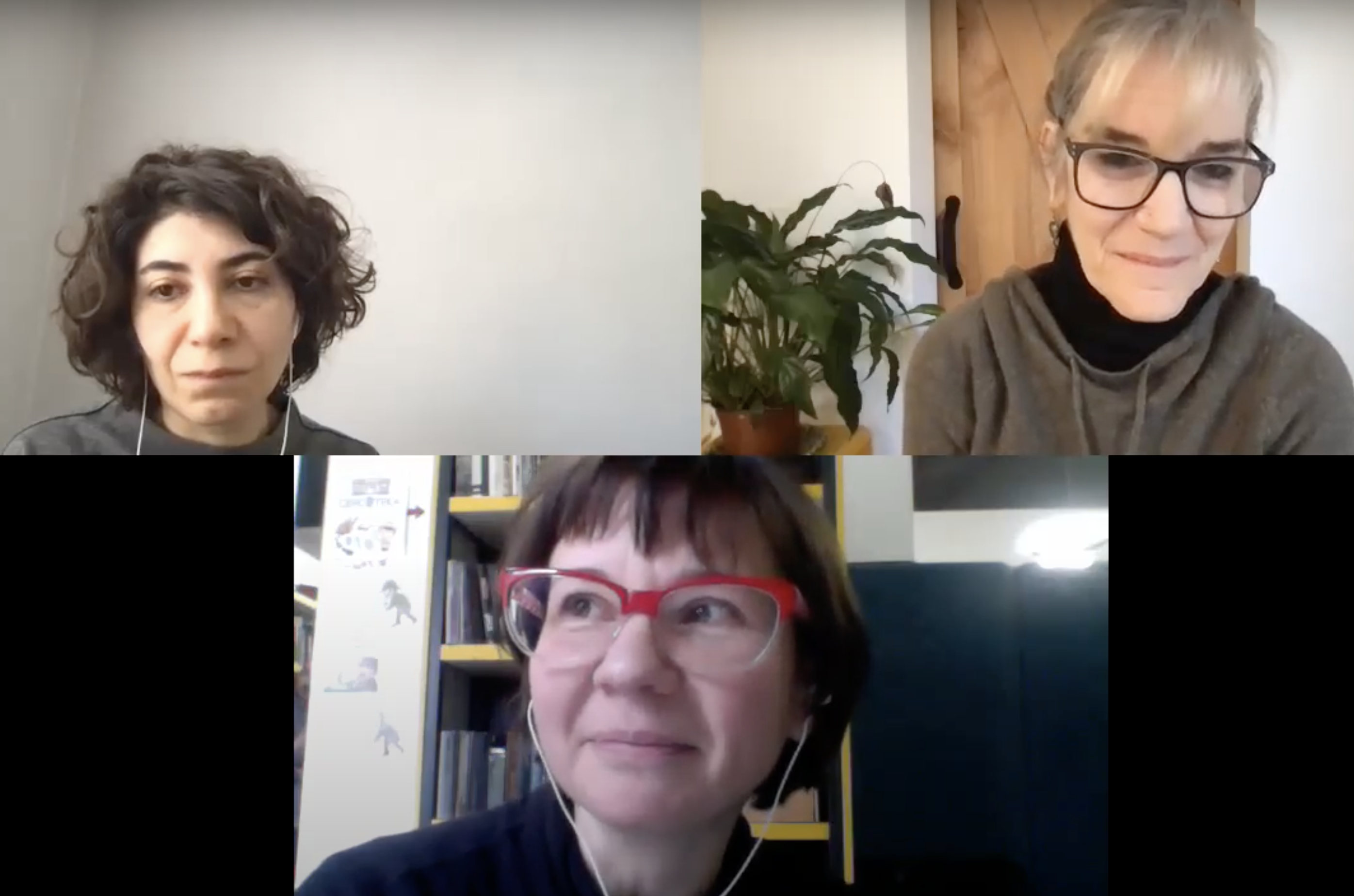A Conversation with Larissa Babij

Still from the zoom conversation
On March 4, Toni Shapiro-Phim and Armine Avetisyan of the Program in Peacebuilding and the Arts spoke with Larissa Babij, a Ukraine-based curator, writer and dancer who had recently fled Kyiv and found refuge in Lviv. Born to Ukrainian parents in Manchester, Connecticut (USA), Larissa moved to Ukraine in 2005, and has lived there ever since.
Larissa joined the Zoom call from a library in Lviv where locals had quickly organized a volunteer relief effort to help in different ways — for example, translating for journalists, and offering temporary shelter to newly-arrived refugees from elsewhere in Ukraine, until they find a longer-term residence locally, or continue on to another country.
Lviv has become a hub for people forced to flee. Many wait in lines there for hours to get onto buses and trains that will take them to Poland, which is just 40 or so miles (60 kilometers) away. Volunteers, including some of Larissa’s artist friends, bring food to those waiting at the station. Lviv’s population is about one million, and around 45,000 refugees had arrived in the city as of March 4 [Note: As of March 6, that number was 60,000]. Even though air raid sirens go off several times a day, and, in turn, Larissa has to move to a bomb shelter or to the corridor of her apartment building for protection, Lviv has not been shelled or bombed, yet (as of this writing), unlike Kyiv, from which she escaped.
Larissa says, “You can’t know or imagine what it’s like to have your home under bombardment until it happens. You can see buildings and infrastructure torn down, but the rupture of the social fabric… the destruction of… communities, is no less tragic.” One of her most vital communities is the social dance community, especially dancers of the lindy hop[1]. Less than two weeks ago, in Kyiv, she was dancing, moving in sync with a partner and surrounded by others also gloriously engaged in creating patterns to specific beats, across the floor. But now, those who make up that community are scattered within and beyond Ukraine’s borders.
“The Russian narrative of protecting itself from Ukrainian aggression by destroying it to smithereens is just obscene. The materiality of what’s happening here is incredible. That’s why my grandparents left European soil after World War II — you have your homeland destroyed because some other authority thinks you should not exist.”
“When war happens, you are a different person than in peacetime,” she adds. “You can’t think in the same logic that you normally do. It requires special courage. It’s about figuring out what each individual can do.”
What those individuals can do is wide-ranging: grandmothers are making Molotov cocktails; librarians are running a shelter; artists are organizing food distribution; music students are performing beloved folk songs in a temporary underground shelter. And, of course, some people are undertaking a number of herculean tasks, all at once. In the face of dehumanization — here we are talking about the indiscriminate murder of civilians, including as they attempt to run from sites of imminent carnage — we are inspired by the Ukrainians who are choosing to see each other as, indeed, the fully complex human beings they are. So many are reaching out, in the midst of danger, to share material, emotional, and cultural sustenance.
In her personal newsletter, prepared for friends and relatives, titled “a Kind of Refugee / 02.03.2022,” Larissa writes, “Countless friends, including artist colleagues I have not spoken to in years, have invited me to Bialystok, Lodz, Berlin, and even offered to drive to the Ukrainian border to pick me up. Thank you, friends, I do not want to leave Ukraine. This quandary between fleeing and standing — I’ve somehow managed to do both — is something I want to think through and, if you don’t mind, share with you.
"The decision to flee for protection or to stand your ground where you are is the primary existential question of the moment. The next question — addressed to any and all who stay — is what are you standing for? If in peacetime staying put can be a passive ‘choice,’ then war turns it into an act.
"Today my heart is most with those still living in Kyiv, Kharkiv and Mariupol, and with the Ukrainian Armed Forces and newly formed territorial defense battalions who are on the ground defending our cities and infrastructure from this unconscionable Russian brutality.”
Notes by Armine and Toni, with gratitude to Larissa.
[1] The lindy hop originated in New York City’s African American communities in the 1920s. Its popularity spread across the globe. Here’s an example of lindy hop from a 2018 festival in Seoul, with dancers from around the world.